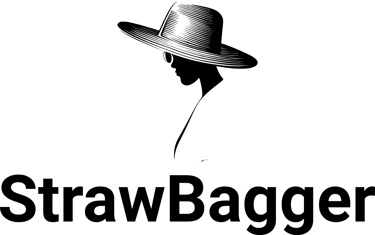Adopt a "strawbagger mindset!"

Modal
Modal: Its Benefits and Uses
Modal is a type of rayon made from beech tree pulp, known for its softness, strength, and environmentally considerate production. When sourced from Lenzing-certified producers, Modal is made in a closed-loop system that reuses water and chemicals, minimizing waste.
Benefits:
Silky and Breathable: Extremely soft and ideal for garments worn close to the skin.
Eco-Conscious Sourcing: Beech trees used in production often grow on non-agricultural land, requiring little irrigation.
Durable and Color-Retaining: Resists shrinking and fading, with a smooth finish that holds dye well.
Moisture-Wicking: Keeps wearers dry and comfortable.
Biodegradable: Decomposes naturally without harming the environment.
Uses:
Underwear, activewear, and loungewear.
T-shirts and casual wear.
Sleepwear and lingerie.
Home textiles like sheets and pillowcases.
Let's take a Closer Look at Modal
Modal as a Sustainable Fabric
1. What is Modal Fabric?
Modal is a semi-synthetic cellulose fiber derived primarily from beechwood pulp. It is a type of rayon, like viscose and lyocell, but is processed differently to achieve enhanced performance and sustainability.
First developed in Austria by Lenzing AG, Modal is often used in apparel, undergarments, loungewear, bedding, and home textiles thanks to its exceptional softness, drape, and breathability.
While Modal is not entirely natural due to the chemical processing involved, certified Modal (like Lenzing Modal™) is manufactured using responsibly sourced wood and closed-loop production, making it a more eco-conscious alternative to conventional rayon or cotton.
2. Environmental Benefits
Sustainable Raw Material Sourcing:
Modal is primarily made from renewable beech trees, which require no artificial irrigation and grow naturally in temperate forests.
Lenzing’s Modal is sourced from FSC® or PEFC® certified forests, ensuring responsible forestry practices.
Efficient Land Use:
Beech trees produce more fiber per acre than cotton, making Modal a more resource-efficient fiber choice.
Reduced Chemical Impact:
Lenzing’s process uses non-toxic chemicals in a closed-loop system, reducing the release of harmful substances into the environment.
Lower Greenhouse Gas Emissions:
Compared to conventional cotton and traditional viscose, Modal production produces fewer emissions and has a smaller carbon footprint.
3. Durability and Longevity
Stronger Than Viscose:
Modal fibers are more resilient and strong, both wet and dry, making garments longer-lasting and resistant to wear.
Retains Shape and Softness:
Doesn’t shrink or pill easily, and remains soft wash after wash.
Ideal for Everyday Wear:
Modal’s strength and flexibility make it perfect for undergarments, activewear, and frequently worn clothing.
4. Low-Waste Production
Closed-Loop Manufacturing (Lenzing Modal™):
Up to 95% of production chemicals are recovered and reused, drastically minimizing waste and water pollution.
Low Water Consumption:
Beechwood trees used for Modal require little to no irrigation, dramatically reducing water usage compared to cotton.
High Fiber Yield:
Modal offers more usable fiber per tree than many other wood-based fabrics, leading to less raw material waste.
5. Versatility and Comfort
Ultra-Soft Hand Feel:
Modal is known for its silky smooth texture and is often described as being softer than cotton.
Lightweight and Breathable:
Wicks moisture away from the skin, making it ideal for warm weather and performance wear.
Elegant Drape:
The fiber’s natural stretch and drape make it a favorite for flowy dresses, tops, and luxe basics.
Blendable:
Blends well with cotton, spandex, or lyocell for added durability, stretch, or structure.
6. Economic and Social Impact
Ethical Supply Chain (Lenzing Modal™):
Lenzing operates under strict environmental and labor guidelines, supporting safe working conditions and fair wages.
Accessible Price Point:
More affordable than TENCEL™ Lyocell or organic silk, while offering a luxurious look and feel.
Growing Use in Conscious Fashion:
Modal is increasingly embraced by sustainable fashion brands for basics, intimates, and soft loungewear.
7. Circular Fashion and Modal
Biodegradable and Compostable:
Like other cellulose fibers, Modal is biodegradable under industrial and home composting conditions when untreated with synthetic dyes or finishes.
Extended Product Life:
The fabric’s durability supports a longer wear cycle, helping reduce overconsumption and garment waste.
Recyclability:
Modal garments are generally recyclable within textile recycling streams designed for natural or cellulosic fibers.
8. Things to Consider
Semi-Synthetic Nature:
Although derived from natural materials, Modal’s processing involves chemical solvents. Only certified Modal (e.g., Lenzing Modal™) guarantees eco-friendly production.
Potential for Greenwashing:
Modal from uncertified sources may involve unsustainable forestry or polluting processes—always check for credible certifications like EU Ecolabel, FSC®, PEFC®, or Lenzing branding.
Care Requirements:
While durable, Modal is best washed on gentle cycles with cold water and air-dried to maintain softness and longevity.
Summary:
Modal is a luxuriously soft, breathable, and sustainable alternative to traditional cotton and viscose. When produced responsibly (e.g., by Lenzing), it offers substantial environmental benefits such as reduced water and chemical use, closed-loop processing, and biodegradability. Its durability and comfort make it ideal for sustainable fashion collections, especially in the basics, intimates, and loungewear sectors.
